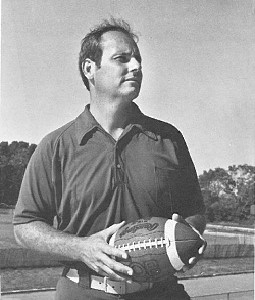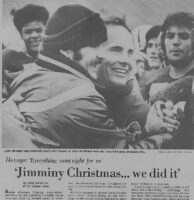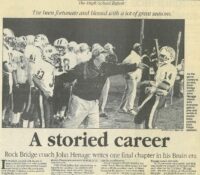Inductees
John Henage

His high school football coaching career in the mid-1960s began like most others – with little fanfare, in relative anonymity and trial runs at three stops. In fact, at one school, he started a football program, only to see a Missouri River flood wipe out a full season.
So talk about paying your dues. John Henage certainly did.
Long before he turned Rock Bridge High School into a state champion and perennial football contender, Henage cut his teeth at a place called Orchard Farm High School in St. Charles.
Memories still flow – of the single victories in the inaugural and second seasons, of the Missouri River flood of 1973, and of the 14-5-1 record over a two-year stretch that opened eyes.
The body of work was spotted by then-Columbia schools athletic director Kent Kurtz and, eventually, assistant Superintendent Jim Ritter called a surprised Henage during one summer dinnertime in 1976. Ritter extended a job offer.
“I was eating a bowl of spaghetti,” Henage recalled, laughing, “and it ended up on my lap.”
What a run it’s been, and the Missouri Sports Hall of Fame is proud to induct Henage as both coach and athletic director in the Class of 2015.
At Rock Bridge alone, Henage won 149 games between 1977 and 1997, and his teams played for state championships in 1977, 1992 and 1993, winning the 1977 Class 3 state title in his first season there. He also coached golf, with his 1979 and 1997 boys teams winning state championships.
His athletic director experience also spans roughly a quarter century, including 18 years at Rock Bridge before, retiring in 2001. He often kick-started various sports programs.
The secret to such success?
“I wanted the kids to have a good taste in their mouths when they left the program,” Henage said. “It wasn’t a win-or-die attitude. I wanted them to have fun.”
Such a strategy created a positive environment. More so, Henage won the right way, say former assistant coaches.
For instance, Henage self-reported a violation in which Rock Bridge used an ineligible player in the 1993 season, costing the team two regular-season victories.
To this day, Henage still takes ownership of the mistake, a paperwork oversight in his role as A.D. The player, on varsity as Henage’s way of helping the boy overcome a difficult home life, played only late in two blowout victories.
“A lot of coaches would have (argued), ‘The player didn’t make a difference,” longtime assistant Dan Devine Jr. said. But Henage notified the Missouri State High School Activities Association anyway.
“He just never thought, ‘We’re not going to do that,’” Devine said. “I think that made a big impression upon the players. He wasn’t going to compromise ethics.”
Said former assistant and former principal Bob Nolke, “He’s always been a role model, not only for students but for people who have worked with him.
“This was a guy who never belittled kids, never raised his voice. That was the way we coached,” Nolke added. “That’s the kind of person, as a parent, I’d want my kid to play for.”
Henage, a graduate of Southwest Missouri State University and member of its 1963 national championship golf team, climbed the coaching ladder the right way, too.
He credits many mentors, such as Fulton’s Bob Fisher and St. Joseph’s Jim Blacklock, as well as assistants in Devine, Nolke, Dan Wright, Jeff Wallace, Terry Whitney, Ray Nunnelly and Bob Howard. He also had support of his bride, Suzanne, and their children, Amy and Casey.
That said, Henage put in the work to reach great heights.
His first post-college job was at his alma mater, Fulton, where he taught junior high and helped the varsity football staff on Friday nights.
Henage moved on to St. Joseph Central, where he assisted football and was head coach of the wrestling team. Between 1970 and 1976 at Orchard Farm, he coached several sports and was the A.D., turning something out of nothing in football.
Along the way, Henage encouraged students to play multiple sports, for the fact that life would soon tug at their letter jackets.
“If a kid came out for football but they just weren’t good,” Henage said, “I’d say, ‘Why don’t you run cross country or some other sport?’ Just don’t quit.’”
He brought hard work such as pre-camp workouts (and a veer-option attack) to Rock Bridge and won a state championship in 1977 by beating Camdenton, 7-6. Nose guard Danny Snap blocked the potential, tying extra-point kick.
That season began on a hot Saturday afternoon, in which Rock Bridge overcame a two-touchdown deficit to win 15-14. Summer workouts were a factor.
“The kids believed in conditioning after that,” Henage said. “And we were the state champs. We got them to believe in the program.”
What a run it was.


